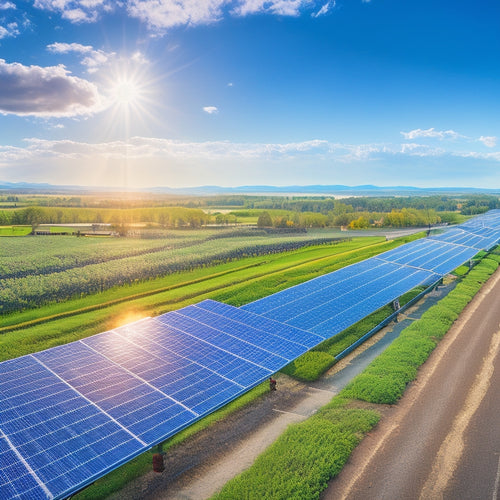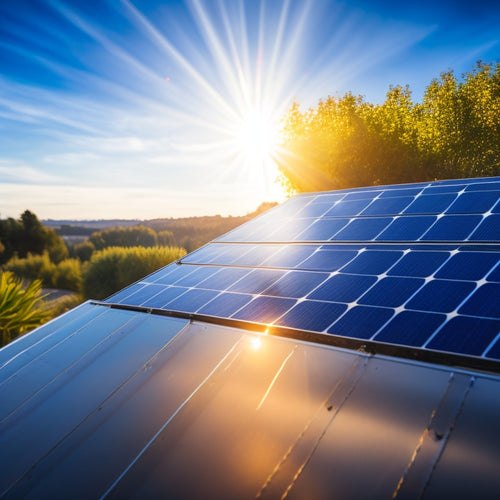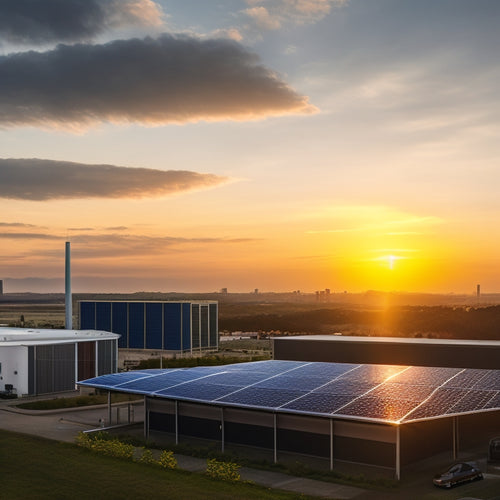
Portable Solar Panels for Home Use
Share
You're taking the first step towards reducing your carbon footprint and energy bills by considering portable solar panels for home use, a convenient and efficient way to utilize renewable energy. These eco-friendly panels promote sustainable living, reduce reliance on traditional power sources, and increase energy independence. With high-efficiency photovoltaic cells, portable solar panels convert sunlight into electricity effectively. To maximize benefits, assess your daily energy needs, understand power consumption patterns, and choose the right-sized panel. By doing so, you'll be well on your way to lowering energy costs and contributing to a cleaner environment - and there's more to investigate in this innovative world of portable solar energy.
The Essentials
- Portable solar panels reduce carbon footprint and energy bills, promoting sustainable living and energy independence.
- They provide off-grid power solutions, ideal for RV camping, emergency situations, and outdoor activities.
- High-efficiency photovoltaic cells convert sunlight to electricity effectively, ensuring sustained productivity and longer lifespan.
- Assessing daily energy needs and understanding power consumption patterns are crucial in selecting the right solar panel size and type.
- Portable solar panels offer a lightweight and compact design, making them easy to transport, set up, and use in various locations.
Reduce Carbon Footprint Easily
You can greatly reduce your carbon footprint by going green at home with portable solar panels.
By utilizing renewable energy, you'll not only contribute less to climate change but also lower your energy bills.
With the ability to provide an alternative power source during outages and emergencies, renewable energy solutions can guarantee you stay connected and safe.
As you start using these eco-friendly panels, you'll notice a considerable decrease in your reliance on traditional power sources.
Go Green at Home
Frequently, homeowners overlook simple opportunities to reduce their carbon footprint, but making eco-friendly changes can be easier than you think. By adopting a sustainable lifestyle, you can contribute to a healthier environment and enjoy the benefits of eco-friendly practices.
Here's a breakdown of simple changes you can make:
| Eco-Friendly Practice | Benefits | Ease of Implementation |
|---|---|---|
| Switch to energy-efficient light bulbs | Reduces energy consumption | Easy |
| Insulate your home | Reduces heat loss in winter | Moderate |
| Use reusable bags and containers | Reduces single-use plastics | Easy |
| Install a programmable thermostat | Regulates home temperature | Moderate |
Lower Energy Bills
By incorporating eco-friendly practices into your daily routine, significant reductions in energy consumption can be achieved, thereby lowering your energy bills. One of the most effective ways to do this is by utilizing the power of solar energy through portable solar panels.
These innovative devices allow you to generate clean energy and reduce your reliance on traditional power sources. By embracing a cleaner, more sustainable future with Renewable Energy Solutions, individuals can tackle three major concerns at once: reducing electricity bills, providing backup power during outages, and contributing to a healthier environment.
By switching to solar power, you can enjoy substantial energy savings and cost reduction. According to the US Department of Energy, solar panels can save homeowners between $400 and $1,000 per year on their energy bills. Additionally, solar power systems can increase your property value and provide a sense of independence from the grid.
Portable solar panels are designed to be efficient and easy to use, making it simple to integrate them into your daily life. They're perfect for charging small appliances, powering outdoor equipment, or even providing backup power during outages.
Increases Energy Independence Fast
You're taking a significant step towards energy independence with portable solar panels, which capture renewable energy from the sun to power your home.
This off-grid power solution allows you to generate electricity on your own terms, reducing your reliance on the grid and providing a sense of security.
With a portable solar power solution system, you can keep your devices charged even when RV camping or during emergency backup situations renewable energy solutions.
Renewable Energy Source
As the world shifts towards a more sustainable future, utilizing renewable energy sources becomes increasingly essential, and portable solar panels are at the forefront of this movement.
You're likely aware that traditional energy sources are finite and contribute to climate change. By capturing solar energy, you're reducing your carbon footprint and reliance on grid power. Portable solar panels offer a convenient way to access this renewable energy source, providing you with a sustainable living solution.
Solar technology has advanced greatly, making it possible to generate clean energy from sunlight. Portable solar panels are designed to be compact, lightweight, and easy to set up, allowing you to take advantage of this renewable energy source anywhere.
By investing in portable solar panels, you're not only reducing your energy bills but also contributing to a cleaner environment. With the ability to generate your own energy, you're taking a considerable step towards energy independence.
Off-Grid Power Solution
Portable solar panels provide a reliable off-grid power solution, allowing you to tap into renewable energy anywhere, anytime. This means you're no longer bound to the grid, giving you the freedom to generate your own power, whenever and wherever you need it.
With a portable solar panel system, you can charge your devices, power your appliances, and even store excess energy in battery storage for later use.
This level of energy independence is made possible by advanced energy management systems. These systems optimize energy production and consumption, ensuring that you're getting the most out of your solar panels.
They also provide real-time monitoring, so you can track your energy usage and make adjustments as needed.
High-Efficiency Photovoltaic Cells
When you're shopping for portable solar panels, you'll want to contemplate high-efficiency photovoltaic cells that boast high cell conversion efficiency, which measures how well the cells convert sunlight into electricity.
Top-rated solar panels, such as those with PERC technology, offer improved efficiency and increased energy output.
This efficiency directly impacts the power output density of your solar panel, with higher efficiencies resulting in more power per unit area.
Cell Conversion Efficiency
In the quest for ideal energy harvesting, high-efficiency photovoltaic cells play a critical role. You're looking for the most power from your portable solar panels, and that means maximizing cell conversion efficiency. This metric measures how well your cells convert sunlight into electrical energy.
The higher the efficiency, the more power you'll get from your panels. Currently, high-efficiency cells boast efficiencies of up to 23%. That's a significant improvement over traditional cells, which typically hover around 15%. You can attribute this enhancement to advanced cell optimization techniques.
Manufacturers have refined their production processes, incorporating better materials and designs to extract more energy from each photon.
When choosing portable solar panels, consider the panel lifespan as well. Higher-efficiency cells often come with a longer lifespan, ensuring your panels remain productive for years to come.
As you weigh your options, prioritize cell conversion efficiency to reveal the full potential of your portable solar panels. With the right technology, you'll be utilizing clean energy in no time.
Power Output Density
High-efficiency photovoltaic cells typically boast a higher power output density, allowing you to generate more electricity per unit area. This means you'll need fewer panels to produce the same amount of energy, making them ideal for portable solar panels. With higher power density, you can enjoy more energy independence and flexibility.
Here's a comparison of different photovoltaic cells and their power output density:
| Cell Type | Power Output Density (W/m²) | Energy Efficiency (%) | Thickness (mm) |
|---|---|---|---|
| Monocrystalline | 200-250 | 20-22 | 3-4 |
| Polycrystalline | 180-220 | 18-20 | 3-4 |
| Thin-Film | 100-150 | 10-12 | 1-2 |
| Bifacial | 220-280 | 22-25 | 4-5 |
| Perovskite | 250-300 | 25-28 | 2-3 |
As you can see, high-efficiency photovoltaic cells like monocrystalline and bifacial offer higher power output density and energy efficiency. These advanced cells are designed to maximize energy production while minimizing space requirements, making them perfect for portable solar panels.
Check Wattage Per Hour
You'll need to determine your daily energy needs to choose the right portable solar panel for your home use.
To do this, you should calculate your power consumption patterns, considering the wattage of each device you plan to power and the number of hours you'll use them daily.
When venturing off-grid, it's crucial to have a reliable portable power solution that can keep your devices charged.
Daily Energy Needs
Your daily energy needs dictate the size and type of portable solar panel system required for your home. To determine your daily energy needs, you'll need to assess your daily usage and energy habits.
Start by making a list of the appliances and devices you plan to power with your portable solar panel system. Next, estimate the number of hours you'll use each device per day. This will give you the total watt-hours (Wh) per day.
For example, if you have a 20W laptop that you use for 5 hours a day, that's 100Wh per day. Calculate the total Wh per day for all your devices and add them up.
A general rule of thumb is to add 10-20% to your total daily energy needs to consider any unexpected energy usage. Once you have your total daily energy needs, you can select a portable solar panel system that can meet those needs.
Remember to choose a system that can provide the required amount of energy, keeping in mind the number of peak sun hours in your area.
Power Consumption Patterns
To accurately assess your power consumption patterns, calculate the wattage per hour for each device by checking the device's power rating, usually indicated on the manufacturer's label or in the user manual. This will give you a clear understanding of your energy habits and usage trends.
For instance, a 100W laptop used for 5 hours a day will consume 500Wh of energy. Calculate this for each device, including lights, refrigerators, and TVs, to get a thorough overview of your daily energy usage.
By analyzing your power consumption patterns, you'll identify areas where you can optimize your energy usage. You might realize that you can reduce your energy consumption by turning off lights during the day or using energy-efficient appliances.
This information will also help you determine the size of the portable solar panel system you need to power your home. With this knowledge, you can make informed decisions about your energy usage and take the first step towards achieving energy independence.
Lightweight for Easy Transport
When you're shopping for a portable solar panel, you'll want to contemplate one that's lightweight for easy transport.
You'll appreciate a panel that's designed to be compact and weighs less, making it easy to carry around.
Look for a model with a durable yet lightweight frame that won't weigh you down when you need to move it.
Easy to Carry Around
Utilizing the power of the sun is no longer restricted to fixed locations, thanks to portable solar panels designed for home use. You can now capture the energy of the sun wherever you go, without being tied to a fixed installation.
One of the key benefits of these portable solar panels is their compact design, which makes them easy to carry around. Whether you're going on a camping trip, RVing, or simply want to have a backup power source for your home, these panels are designed to provide you with the freedom to generate power on the go.
When it comes to travel convenience, portable solar panels are hard to beat. They're lightweight, making them easy to transport, and can be folded up and stored in a compact carrying case when not in use.
This means you can take them with you wherever you go, without having to worry about bulky equipment or complicated setup. With a portable solar panel, you can enjoy the freedom to generate your own power, wherever and whenever you need it.
Frequently Asked Questions
Can I Use Portable Solar Panels for Powering My RV or Boat?
You can definitely use portable solar panels to power your RV or charge your boat's batteries, providing a reliable source of energy on-the-go, especially in remote areas with limited access to traditional power sources.
Are Portable Solar Panels Durable Enough for Outdoor Use?
You might worry that portable solar panels won't withstand harsh outdoor conditions, but they're built to last, withstanding rough handling and extreme temperatures. In a performance comparison, they often outshine traditional panels, and with simple maintenance tips like cleaning and storage, you'll guarantee peak energy output.
Do I Need Special Training to Install Portable Solar Panels?
When tackling installation, you won't need special training, but you'll need to follow specific installation requirements and take necessary safety precautions to guarantee a successful setup that gives you the freedom to utilize renewable energy.
Can I Connect Multiple Portable Solar Panels for More Power?
As you investigate renewable energy, did you know that the global solar market is projected to reach 23.8% annual growth by 2025? You can connect multiple portable solar panels for more power, increasing solar panel efficiency and expanding charging options, giving you the freedom to generate energy on your terms.
Are Portable Solar Panels Resistant to Water and Weather Damage?
You'll find that many portable solar panels boast waterproof ratings and weatherproof features, ensuring they can withstand harsh outdoor conditions; look for IP67 or higher ratings and durable materials like anodized aluminum for ideal protection.
Final Thoughts
You've finally joined the renewable energy revolution with portable solar panels for home use! Now, you're utilizing the power of the sun like a 19th-century alchemist turning sunlight into gold. With these state-of-the-art panels, you're reducing your carbon footprint, increasing energy independence, and capitalizing on high-efficiency photovoltaic cells. Just remember to check the wattage per hour to guarantee a seamless shift. And, with their lightweight design, you can take your eco-friendly setup wherever you go - a true breakthrough for the modern homesteader.
Related Posts
-

Applications of Photovoltaic Systems
Photovoltaic systems are versatile, converting sunlight into electricity for various applications. You can use them i...
-

How Efficient Are Thin Film Solar Cells
Thin film solar cells provide an innovative approach to energy generation, boasting efficiency rates generally betwee...
-

Advantages of Commercial Solar Battery On-Site Storage
By investing in a commercial solar battery on-site storage system, you can greatly reduce your energy grid dependence...


